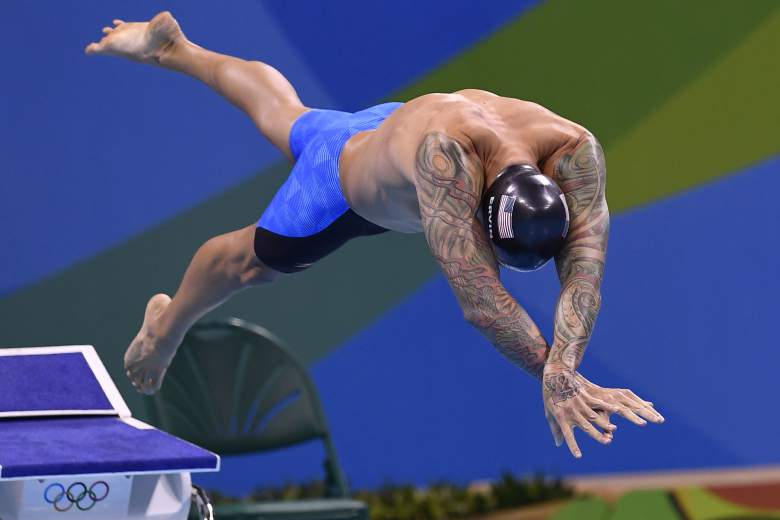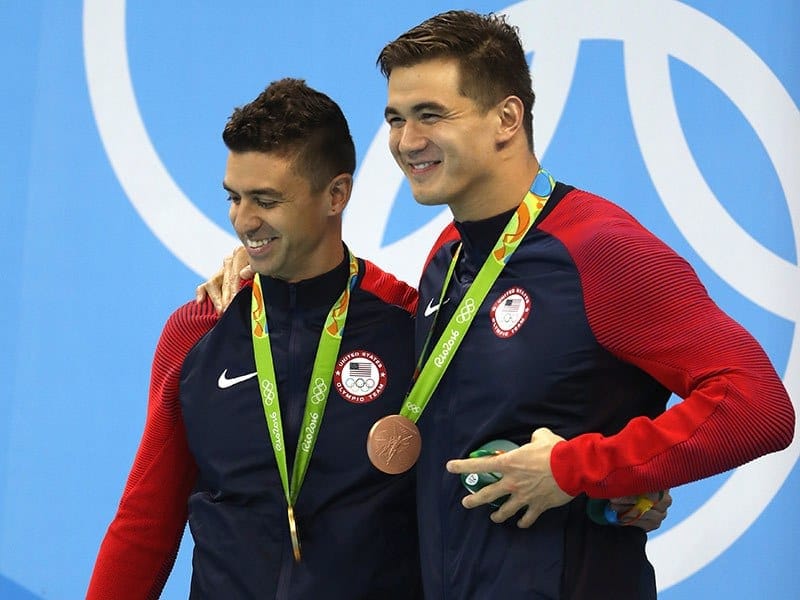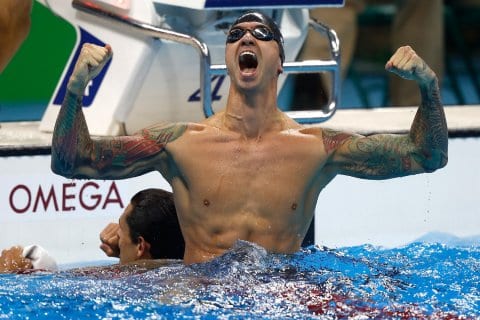
Seven years away from competition is a long time, but don’t tell Anthony Ervin that. If you tuned into the 2016 Rio Olympics at any point, and more specifically to the swimming, odds are you heard his name and story. Anthony Ervin won Olympic and World Championship medals as a young swimmer in his early 20s and retired shortly after. His journey after that was a long way from swimming; it was one involving drugs and reckless behavior. But he eventually made his way back to the pool, and 16 years after winning his first Olympic medal, Ervin won another gold in the 50m freestyle in Rio.
This past July, Ervin was invited to compete as part of Maccabiah USA’s team at the Maccabiah in Israel, an event termed by some as the Jewish Olympics. At first he wasn’t sure about coming to Israel to compete, he tells Sports Retriever, but after visiting the country he decided to give it a go and was even given the honor of being a torchbearer.
We had the chance to chat with Ervin after the competition, to talk about his experience in the Maccabiah, Rio and what’s next.
Question: This was your first time coming to Israel to compete and you were a torchbearer at the opening ceremony for the Maccabiah, tell us about your experience.
Answer: Obviously the torch bearing was a once in a lifetime experience for me, I was not expecting it, it was not anything I ever thought I would do, but it was very cool. Especially since I think of myself as a water person and you go out there and carry the fire around, not let it go out, to light the flame. The eternal flame that burns. That flame it’s symbolic, not just for the Maccabiah or just for sports, but for a lot of things. That it will forever burn and be seen and at the same time be controlled, so it does not just destroy everything. I’m getting bit existential for you, but you asked!
It wasn’t too abnormal [to have a “celeb status’]. Swimmers know me, swimmers know how to recognize me. People from other sports don’t really, it’s pretty rare. But it was nice to see so many people, or Jews as it were, from other countries coming to swim. Even the Americans, swimming with them. And yes, they are younger. But you know, BJ Johnson was on the team, and he’s 30 years old, and we’d been on the national team together, we competed at the World Championships together. So he is definitely as elite as it gets, you know like short of some of the accomplishments I’ve had.
It didn’t feel as if I was too big of a celebrity. I was a strong member of a team. As the United States of America we go in there United we try to compete as a team, we rise as team, we fall as a team. And we had some great swims.
Q: Having been around the sport for over two decades were you able to offer any advice to the athletes around you?
A: For sure, especially the juniors like to ask questions. You know, ask how do i improve this? How do I go faster? So I try to offer what little bit I can give, and if nothing else I always try to take the question they ask, the words they use, the containment or the logic in which they frame their understanding of the question and I try to re-spin it. I make them think about what they’re asking in a new way instead of just providing them with an answer. I feel like that’s what a lot of swimming is, being able to reimagine and reinterpret what would be the structure that you think you’re limited by, because it isn’t a structure, it’s a medium, and you’re, it’s constantly in flux. And whenever you achieve one state you have to go back into flux in order to remap that state into something faster.
Q: You left swimming for a while. What was your path back to swimming, was there any single moment in which you said ‘I need to dive back into the pool’?
A: That moment came specifically after I finished my end of semester graduate school paper, where I kind of, a lot things that went into my book, as far the skeletons in the closet so to speak, the skeletons were unearthed to be exposed. Once I’d done that there was an immense catharsis and I felt a change coming. A reverse Kafka, instead of a human turning into a bug, I felt like I was emerging into something else, something a little bit more powerful.
Coupled with that was as well, I’d spent years smoking cigarettes and I wanted to finally stop, and it all seemed to come together. Knowing what I know about addiction, you can’t just eliminate this great source of power that you use, you have to replace that great source of power. So when I took the smoking out, I had to replace this powerful force on my lungs, and I did it by getting back into the water and swimming, in a very non competitive way, just in a using my body, discovering something that I knew before. I was experience a Renaissance of my body in swimming
Q: You won the gold in Rio for the 50m freestyle, what was going through your head when you realized you’d won gold again?
A: The first initial thought was kind of ridiculous, quite surreal that I was able to win again.
On paper, I belonged in the final and I definitely believed I had a shot at a medal. But winning, I feel like nobody ever knows. The 50 freestyle is a race where you don’t really have the opportunity to look around, or at least you shouldn’t. Every other race you have to breathe, so you have these opportunities to see what your opponent is doing. But the 50 I don’t breathe, I just stay focused on my own like internal line, executing the program I’ve been putting into my body. It wasn’t like I knew where I was in the race, at all. It wasn’t until I was done that I see how I finished.
To win? Unexpected, somewhat surprising but not unbelievable. But then the next moment was a recognition that there were a lot of people watching that I care deeply about, my people. My friends, my family, all those people who have been with me though the long journey. I picked up some along the way, some had fallen off when I decided to go deeper into the gorges for a bit before emerging. But I knew all those people were out there watching, so I kind of gave a yelp for them, when I did that big yelling flex. The flex just helps you yell more, makes it for a bigger yell.

Q: You haven’t had an ordinary career to say the least, and you wrote about it in your book, Chasing Water. Many have said it’s the most real they’ve seen authors get while writing a memoir. How did you decide how much of yourself to share in the book?
A: That was very hard, that was constantly on my mind and my co-author Constantine who is one of my best friends. There was a lot there, and it was tough. It certainly wasn’t a tell all and yes everything is real, but also, it’s only a couple hundred pages, trying to condense and extract from you know, 30 years of life. A lot has to left out, for sure. And there were definitely some things that I wasn’t prepared to tackle publicly in any kind of way, because I didn’t know if I necessarily had the answers. I really chose things that I felt I had an answer for, or enough of an answer for, that I can bear the burden of that responsibility if I put it out there in writing publicly. That’s more or less how I made the choices. For the unanswered stuff, they kind of got axed.
Being that it’s a memoir of a life that’s still living, the arc as it goes up and expands it has to come back down and come to a finite point for a finish. But the real life, as you know, it keeps getting bigger and bigger. It doesn’t really condense, not when you’re 30 something years old. It was somewhat, I don’t want to use the word contrived, but it was deliberately to peel off certain branches of a tree so it can come to a point at the end.
Q: You auctioned off your previous medals, do you plan on keeping the last one from Rio?
A: Right now it’s still in my possession, yup.
Q: What’s next for you, will we see you in Tokyo in 2020?
A: It’s not that far off, I’ve been working on some new things, trying to take in some new body abilities. I’ve been a little bit out of the water, I’ve been on land working on things a bit, but I will definitely be returning for a full swing in the water for 2020. I’m at least going to be respectable for a 39-year old at Olympic trials.












